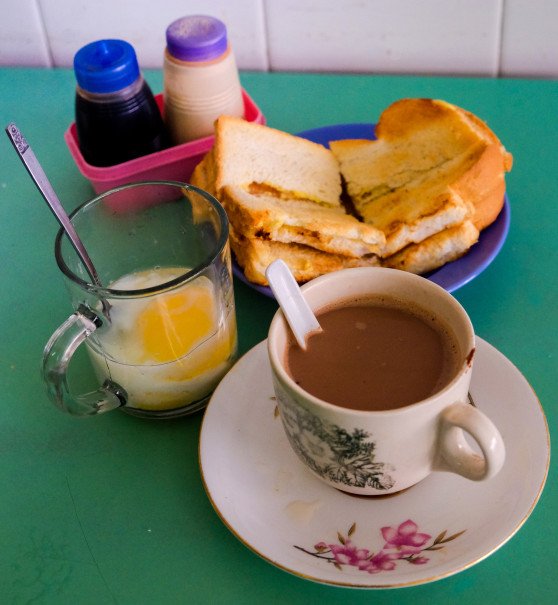
Burnt Bread to Bind a Nation

Burnt Bread to Bind a Nation
Roti Bakar in Malaysia
The three main ethnic groups of Peninsular Malaysia certainly have their own distinct food traditions. But roti bakar – literally, “burnt bread” – is one of those breakfast plates that, when served hot in front of any Malay, Chinese, or Indian, silences cries of controversy in favor of soft, humming sounds of delight. Different from the Malaysian staple pancake roti canai, a crunchy-soft disk made by frying flour and water, roti bakar’s base ingredient connects the past and present of this complicated postcolonial nation with its simplicity. I am talking about white bread.
In Malaysia, the concept of using bread for breakfast is certainly the most appreciated leftover of the British Empire, who ruled Malaysia from the 18th century well into the second half of the 20th. Besides wearing funny wigs and long white stockings, the Brits helped introduce simple white bread to the Malaysian diet.
But even the most basic foods in Malaysia are vessels for culinary transformation, and roti bakar is indeed simplicity turned into morning-time deliciousness: two slices of dense bread grilled over charcoal and smeared with butter or kaya, a deeply addictive sweet coconut jam. The sugary layer cements the two slices of bread into a majestic two-inch thick grilled brick that eats as hot as the stones it’s roasted upon. Expertly cut in eight smaller bite-sized chunks, it makes no sense without a thick cup of kopi panas – the local brew laced up with unspeakable quantities of condensed milk. It’s a sure energy booster, but also a main cause of obesity and diabetes among Malaysians.
But let’s leave it to the doctors and go back to breakfast: the third pillar of this quintessential Malaysian breakfast is a soft boiled egg smashed into a glass and served on the side. With a splash of soy sauce and a pinch of black pepper to balance the sandwich’s sweetness, the lukewarm pool of egg yolk is where each piece of roti bakar should be meticulously dunked before consuming. The mix of ultra-sweet coffee, hot crunchy bread, and sour-salty egg injects life into any body, regardless of race, color, or creed. You can get slightly different variations of roti bakar at old Chinese coffee shops, flimsy roadside stalls manned by Indians, or at any respectable Malay warung. In fact, the real magic of roti bakar is that it leavens the differences of a multi-ethnic nation into two slices of bread—a powerful thing for a breakfast.